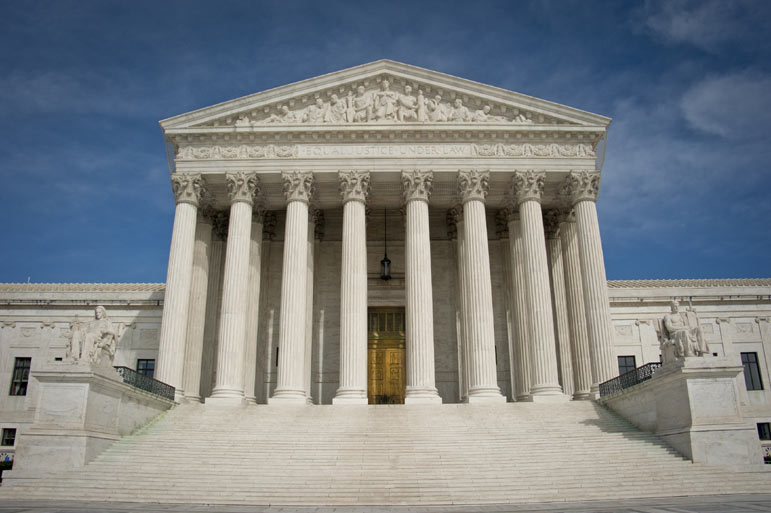
It's not often that "The Wire" comes to the U.S. Supreme Court. But in Ocasio v. U.S., a scenario ripped straight from the greatest television show was on the docket of the highest court in the land. It involves (of course) the Baltimore Police Department, corruption and wiretapping. And it raises an arcane-sounding legal question: Can you be convicted of conspiracy to commit extortion if your alleged co-conspirator is none other than the victim of your scheme?
Samuel Ocasio was a Baltimore police officer who participated in a kickback plot that worked like this: At an accident scene, the officer would refer stranded motorists to the Majestic Repair Shop for towing and repairs. Then the owners of Majestic would pay the officers $150 to $300 a car.
The scheme was apparently well-known within the Baltimore police. In one wonderfully representative example, Ocasio convinced a driver who had already called AAA to cancel the call and use Majestic. Then he called Majestic to request a delay because his supervisor was nearby.
The reason we know about this is, well, a wire. Federal agents were wiretapping Majestic, and they recorded scores of calls connected to the kickbacks.
Ocasio's fellow officers all pleaded guilty. But Ocasio decided to roll the dice. After he was convicted, he appealed to the U.S. Court of Appeals for the 4th Circuit.
His argument was deceptively simple. The sole charge in the indictment was conspiracy to commit extortion. The relevant law, called the Hobbs Act, defines extortion as "the obtaining of property from another, with his consent, under color of official right."
Ocasio claimed he couldn't be guilty of conspiring to obtain property from Majestic's owners because they couldn't be guilty of extortion. They in turn couldn't be guilty because they were being extorted, not doing the extorting. They weren't obtaining property from themselves, after all. And they couldn't have conspired to obtain property from "another," because they were part of the conspiracy, not outside it.
Ocasio's lawyers didn't dream up the argument themselves. The 7th Circuit had reached this conclusion in a 2007 case called U.S. v. Brock.
But the 4th Circuit rejected the logic of the Brock case. It held instead that, as a matter of common sense, a "mere extortion victim" couldn't be said to count as a conspirator in his own extortion. But the owners of the Majestic garage weren't mere extortion victims. They were full participants in the kickback scheme. Therefore, the 4th Circuit thought, they could be construed as having conspired with Ocasio to commit the extortion.
This created a circuit split, precipitating Supreme Court review. Now the question before the court is, who's right? Should the conspiracy and extortion laws be read loosely, to include those who conspire with government officials in a scheme like the Baltimore one? Or should they be read literally, to exclude such cases?
For Justice Antonin Scalia, the case should be easy. As a textualist, he likes to follow the words of the law alone. And he also likes to apply what's called the rule of lenity, under which criminal laws should be interpreted favorably to the defendant, not the government. Both point toward letting Ocasio go free.
The case should be harder for a purposivist like Justice Stephen Breyer, who thinks the controlling influence on statutory interpretation should be the law's evident purpose, not its literal wording.
The extortion law arguably reads as though it was designed to cover only extortion by a government official of someone else who consents to make an illegal payment. Yet by its nature, extortion requires some agreement between the extorter and the person extorted, who gives "consent." That agreement suggests a potentially criminal purpose, in case the person technically being extorted also derives some substantial gain, like the garage owners apparently did.
Then there's the apparent absurdity of letting Ocasio go free because he can't have conspired with the people he obviously did conspire with. This shouldn't matter to Scalia. But it should to Breyer, who wants laws to make sense as applied in the real world.
The best conclusion may actually be that conspiracy is an overused criminal charge. Ocasio must've been guilty of other crimes, too, arising from the same kickback scheme. He was either accepting a bribe or himself committing extortion, or maybe both. The conspiracy charge was probably intended to bump up his sentence by bringing in the crimes of the whole Baltimore police crew.
On "The Wire," Ocasio would get a walk -- while his fellow officers are serving jail time or have lost their careers and pensions. In the real world, that might just happen. It depends on Scalia and Breyer's colleagues --- and on the theory of interpretation they prefer.
Whoever said statutory analysis can't be fun?
Comment by clicking here.
Noah Feldman, a Bloomberg View columnist, is a professor of constitutional and international law at Harvard University and the author of six books, most recently "Cool War: The Future of Global Competition."
Previously:
• 10/29/15: Law schools shouldn't baby their applicants
• 10/20/15: Egypt's parliamentary vote is sign of Arab winter
• 10/14/15: What you watch on your phone might not be private
• 10/13/15: Appeals court gets twisted in yoga copyright case
• 08/24/15: Black America has no rising leader, not even Obama
• 07/03/15: Supreme Court reaches the end of a political era
• 06/03/15: Will the Supreme Court really empower illegal aliens to vote?
• 01/27/15: Why judicial elections are idiotic and bad for law



 Contact The Editor
Contact The Editor
 Articles By This Author
Articles By This Author